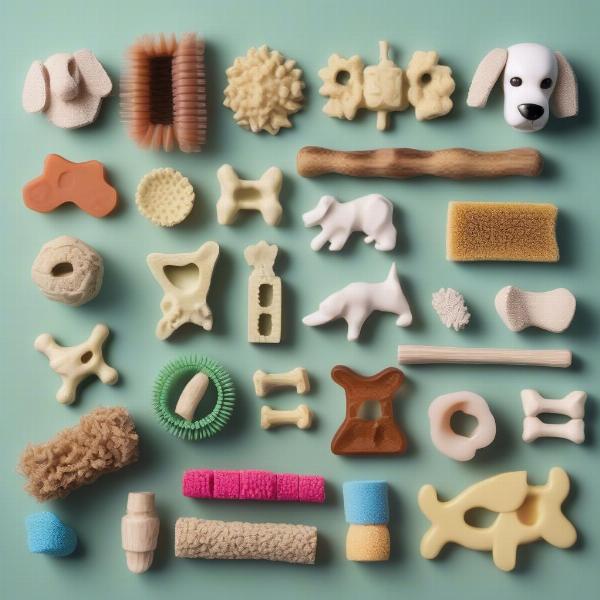Dental care is crucial for your dog’s overall health and well-being. “Dental help for dogs” encompasses a wide range of practices and products designed to keep your furry friend’s teeth and gums healthy, preventing painful dental diseases and ensuring they can enjoy their favorite meals and toys for years to come. Ignoring your dog’s dental hygiene can lead to serious problems like periodontal disease, tooth loss, and even infections that can spread to other parts of the body. This comprehensive guide will cover everything you need to know about maintaining your dog’s oral health, from daily brushing to professional cleanings.
Understanding the Importance of Dental Help for Dogs
Just like humans, dogs can suffer from plaque and tartar buildup, leading to gingivitis and eventually periodontal disease. Periodontal disease is a serious infection that can damage the supporting structures of the teeth, causing pain, tooth loss, and even impacting overall health. Providing dental help for your dog isn’t just about fresh breath; it’s about preventing pain and promoting a longer, healthier life.
Brushing: The Cornerstone of Canine Dental Care
Brushing your dog’s teeth regularly is the most effective way to remove plaque and prevent tartar buildup. Start slowly, introducing the toothbrush and dog-specific toothpaste gradually. Aim for daily brushing, but even a few times a week can make a difference.
 Dog Dental Chews and Toys
Dog Dental Chews and Toys
Choosing the Right Tools for the Job
Use a soft-bristled toothbrush designed specifically for dogs. Human toothpaste contains ingredients that are toxic to dogs, so always use a veterinarian-approved dog toothpaste. These come in flavors dogs love, like poultry or beef, making brushing a more enjoyable experience.
Beyond Brushing: Other Forms of Dental Help for Dogs
While brushing is essential, there are other ways to support your dog’s dental health:
- Dental Chews and Treats: These can help scrape away plaque and tartar as your dog chews. Look for the Veterinary Oral Health Council (VOHC) seal of approval to ensure effectiveness.
- Dental Diets: Some specially formulated dog foods are designed to mechanically clean the teeth as your dog eats.
- Dental Toys: These toys often have textured surfaces that can help clean the teeth.
- Dental Sprays and Wipes: These can be used for quick cleaning or for dogs who resist brushing.
Professional Dental Cleanings: When to Seek Expert Help
Even with diligent home care, professional dental cleanings are necessary. Your veterinarian can recommend the appropriate frequency based on your dog’s breed, age, and overall dental health. During a professional cleaning, your dog will be under anesthesia, allowing the veterinarian to thoroughly clean the teeth, remove tartar buildup below the gum line, and address any existing dental problems.
Recognizing the Signs of Dental Problems in Dogs
Be vigilant for signs of dental issues in your dog, such as bad breath, red or swollen gums, difficulty chewing, excessive drooling, pawing at the mouth, or decreased appetite. If you notice any of these signs, consult your veterinarian immediately.
Dental Help for Puppies and Senior Dogs
Puppies need early introduction to dental care to establish good habits. Start by gently rubbing their gums and teeth with a soft cloth, gradually introducing a toothbrush and toothpaste. Senior dogs may require more frequent professional cleanings and specialized care due to age-related dental issues.
Is Beef Trachea Safe for Dogs’ Teeth?
Beef trachea can be a good chew for dental health, but always supervise your dog and choose appropriately sized pieces to prevent choking hazards.
“Regular dental care is an investment in your dog’s long-term health and happiness,” says Dr. Emily Carter, DVM, a veterinary dentist with over 15 years of experience. “Preventing dental disease is far easier and less costly than treating it.”
Conclusion: A Lifetime of Healthy Smiles
Providing dental help for your dog is a vital part of responsible pet ownership. By incorporating regular brushing, appropriate dental products, and professional cleanings into your dog’s care routine, you can help them maintain healthy teeth and gums for a lifetime of happy smiles. Remember, “dental help for dogs” is not just about aesthetics, it’s about overall health and well-being.
FAQ
- How often should I brush my dog’s teeth? Ideally, daily. However, even a few times a week is better than nothing.
- What type of toothpaste should I use for my dog? Always use veterinarian-approved dog toothpaste, as human toothpaste is toxic to dogs.
- What are the signs of dental problems in dogs? Bad breath, red or swollen gums, difficulty chewing, excessive drooling, pawing at the mouth, or decreased appetite.
- When should I take my dog for a professional dental cleaning? Consult your veterinarian, who can recommend the appropriate frequency based on your dog’s individual needs.
- Can I use human dental floss on my dog? No, use specialized dog dental floss or dental picks designed for dogs.
- Are dental chews effective? Yes, many are effective, especially those with the VOHC seal.
- What should I do if my dog resists brushing? Start slowly, using positive reinforcement and gradually introducing the toothbrush and toothpaste.
About ILM Dog
ILM Dog is your trusted international resource for expert advice on dog care and breeds. We provide comprehensive information on all aspects of dog ownership, from puppy selection and training to senior dog care and everything in between. Our aim is to empower dog owners worldwide with the knowledge and resources they need to provide the best possible care for their canine companions. We offer expert guidance on breed selection, health and medical care, training and behavior, nutrition, grooming, exercise, and much more. For any inquiries or to connect with our team of experts, feel free to contact us via email at [email protected] or call us at +44 20-3965-8624. Visit ILM Dog for more information.